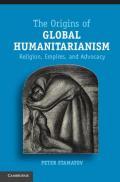
“Whether lauded and encouraged or criticized and maligned, action in solidarity with culturally and geographically distant strangers has been an integral part of European modernity. Traversing the complex political landscape of early modern European empires, this book locates the historical origins of modern global humanitarianism in the recurrent conflict over the ethical treatment of non-Europeans that pitted religious reformers against secular imperial networks. Since the sixteenth-century beginnings of European expansion overseas and in marked opposition to the exploitative logic of predatory imperialism, these reformers - members of Catholic orders and, later, Quakers and other reformist Protestants - developed an ideology and a political practice in defense of the rights and interests of distant “others.” They also increasingly made the question of imperial injustice relevant to growing “domestic” publics in Europe. A distinctive institutional model of long-distance advocacy crystallized out of these persistent struggles, becoming the standard weapon of transnational activists”–